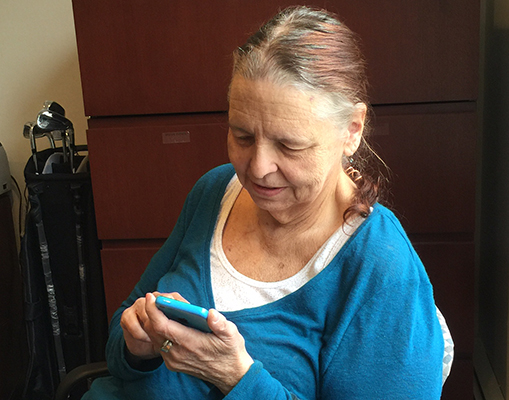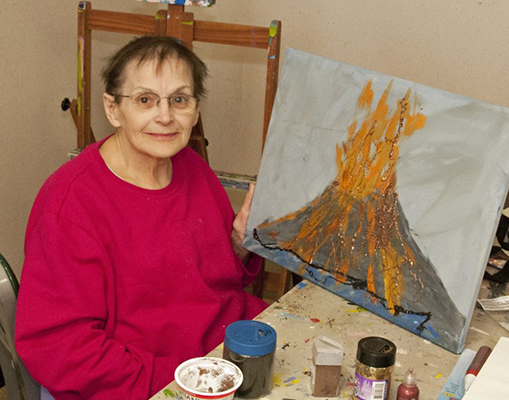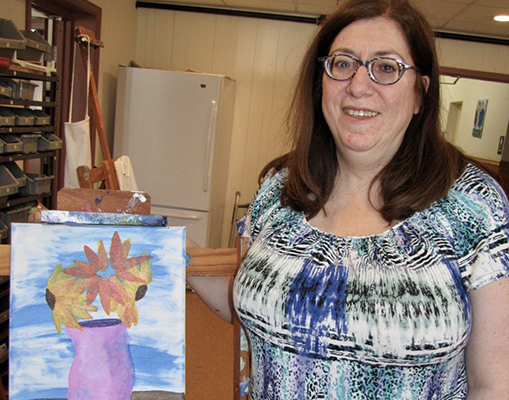
by admin | May 30, 2018 | News
Vision Loss Alliance of New Jersey recently added low vision occupational therapy to its services, offering one-on-one sessions at its Denville location to help adults losing their sight learn adaptive skills and optimize their remaining vision.
“Vision loss doesn’t mean life has to stop. People dealing with it have to adjust and adapt, learning to do things differently,” Vision Loss Alliance Program Director Elsa Zavoda said. “Through occupational therapy, adults can learn tools and strategies to engage in the activities they enjoy.”
Adding low vision occupational therapy is a natural extension of Vision Loss Alliance’s offerings, Zavoda said. For 75 years, the nonprofit has been empowering adults with vision loss through group classes that teach skills for independence and help participants improve their physical and emotional health.
“This service will help fill an unmet need for an underserved and growing population in New Jersey,” said Zavoda, one of only two occupational therapists in New Jersey certified in low vision by the American Occupational Therapy Association. More than 160,000 New Jersey residents are either blind or have severe vision loss, and that number is expected to increase as the population ages. Adults age 60 and over make up 20 percent of the state’s residents, but that percentage is projected to grow to 26 percent by 2030.
One of the program’s major goals is to teach people how to maximize the vision they still have, she said. Zavoda will assess participants’ current vision and life circumstances to help prioritize their goals for therapy. “It’s a very self-directed course, individualized to each person, she said.
Occupational therapy participants will attend hour-long sessions weekly or biweekly, Zavoda said. The program covers “anything in a person’s life that is affected by their vision loss,” Zavoda said. That includes home safety, cooking, grooming, medication management, paying bills, reading, appropriate lighting, watching television, and using the computer. Most participants will complete the therapy in four to six sessions, she said.
Low vision rehabilitation services are covered by Medicare and private insurances. Vision Loss Alliance helps those interested determine if their policy covers the service.

by admin | May 28, 2018 | Program
My name is Kath and I lost my sight in 2009 to Diabetic Retinopathy. I got my first glimpse of the value of Vision Loss Alliance of New Jersey’s tech program a few years ago while enrolled in the organization’s Better Health and Wellness program in Montclair.
I was using a flip phone at the time and couldn’t imagine any reason for switching to an iPhone. My phone allowed me to dial numbers vocally, and really, what more did I need?
In the Better Health and Wellness program, I was surrounded by classmates whose knowledge and wisdom I admired and trusted. I heard them using amazing applications. The first app that really grabbed my attention was one called “BlindSquare.” It worked in a manner similar to that of a GPS in a car, but this one enabled a blind or visually impaired person to know exactly where she was standing on a block or in a mall! What freedom!! Another app that drew my interest was called “TapTapSee.” This one identified items photographed with the phone. Ah! The joy of finding peas in the can when you opened it, as hoped for.
I decided to sign up, buying an iPhone just before classes started at the Denville location.
The experience wasn’t easy at first. There I was in an unfamiliar space that offered a frustrating set of classes that had me wanting to throw the phone out the window — or at the least across the room. But I was surrounded by classmates who understood where I was coming from, and who both commiserated with me and taught me to laugh at the experience. I found teachers with enormous knowledge of these highly technical topics and even greater patience with people like me who were groaning students convinced they’d never learn.
Over time I did learn, and I went on to use the iPad and a Bluetooth keyboard. These days, I volunteer as an assistant teacher, where I get the great blessing of sharing in and cheering on my students’ successes!

by admin | May 28, 2018 | Blog
When Charlene began to lose her sight she was struck by how much her life was going to change. For her entire life she had been a voracious reader “I would sit up all night, holding my eyes open to finish a book,” she said. This was my whole life, to read.”
As her sight diminished, she stopped reading. “I was devastated,” she said. “It was horrendous. To think that someday the lights would go out and it would be dark until the end.” It was at this point that she heard about Vision Loss Alliance of New Jersey. “I heard wonderful things about wonderful people. They were painting, They were cooking. They were having fun.”
Charlene made the decision to attend the one day Essential Low Vision program to learn more about living with vision loss. She immediately felt welcome. “I walked in and I met other people. There were no sad sacks here. There was too much laughter, too much humor, too much comaraderie.”
She joined the Better Health & Wellness program and came every week to Denville, where she learned to paint. She painted so much that after her pictures lined the walls of her home she began to give them as gifts. “I had to come here at 71, and going blind, to find out I like to paint! And people like what I paint,” Charlene said.
Charlene now tells everyone she meets how Vision Loss Alliance changed her life, and encourages everyone living vision loss to call and register for classes, She tells them “Vision Loss Alliance changed my life… I may have lost my sight, but I have not lost my vision.”

by admin | May 28, 2018 | Blog
Diagnosed with a degenerative eye disease at age 8, Bergen County resident Debbie skillfully adapted to her deteriorating vision through young adulthood, marriage and motherhood. But in 2015, at age 53, the loss was so dramatic that it drove her into a severe depression.
“I felt like I couldn’t take care of my kids. I couldn’t drive. I couldn’t go anywhere. I just sat on the couch for a year and a half,” the married mother of three said. “Every other time my vision dropped, I was able to adapt, but I knew this was a final thing. I just kept crying.”
Debbie has degenerative myopia, the seventh leading cause of legal blindness. Her right eye suffered a retinal detachment and sees only light and darkness, while objects viewed through her left eye appear to be flashing, and she lacks depth perception and peripheral vision, she said. There are areas of total vision loss in both eyes.
Fate brought her to Vision Loss Alliance of New Jersey. At the Elmwood Park Diner, Debbie met Dennis, whose wife, Lori, attends Vision Loss Alliance’s Better Health & Wellness program. Noticing Debbie’s cane, Dennis told her about how Vision Loss Alliance helps people with vision loss reclaim their independence.
“When he mentioned an art class, I perked up,” said Debbie, who had studied design in college.
Dennis drives his wife to Vision Loss Alliance in Denville on Thursdays and offered to drive Debbie too. She enrolled in immediately, taking a full day of classes and participating in peer support counseling. The depression soon lifted.
“This place saved my life!” exclaimed Debbie said. “It awakened me, and I feel good.” Art therapy, not surprisingly, became her favorite class, as well as time speaking one-on-one with the art therapist.
Debbie looks forward to spending Thursdays at Vision Loss Alliance. She takes an energy class, two sessions of art, yoga and music appreciation. “They feed my mind, body and soul,” she said. During lunch, she chats with the other participants. “I help other people, some who can’t see at all, and that makes me feel good too,” she said.
Joy has returned to Debbie’s life. She recently celebrated her twin daughters’ b’not mitzvah.
“This place is what pulled me out of depression,” Debbie said. “I enjoy everything here – especially the people.”




